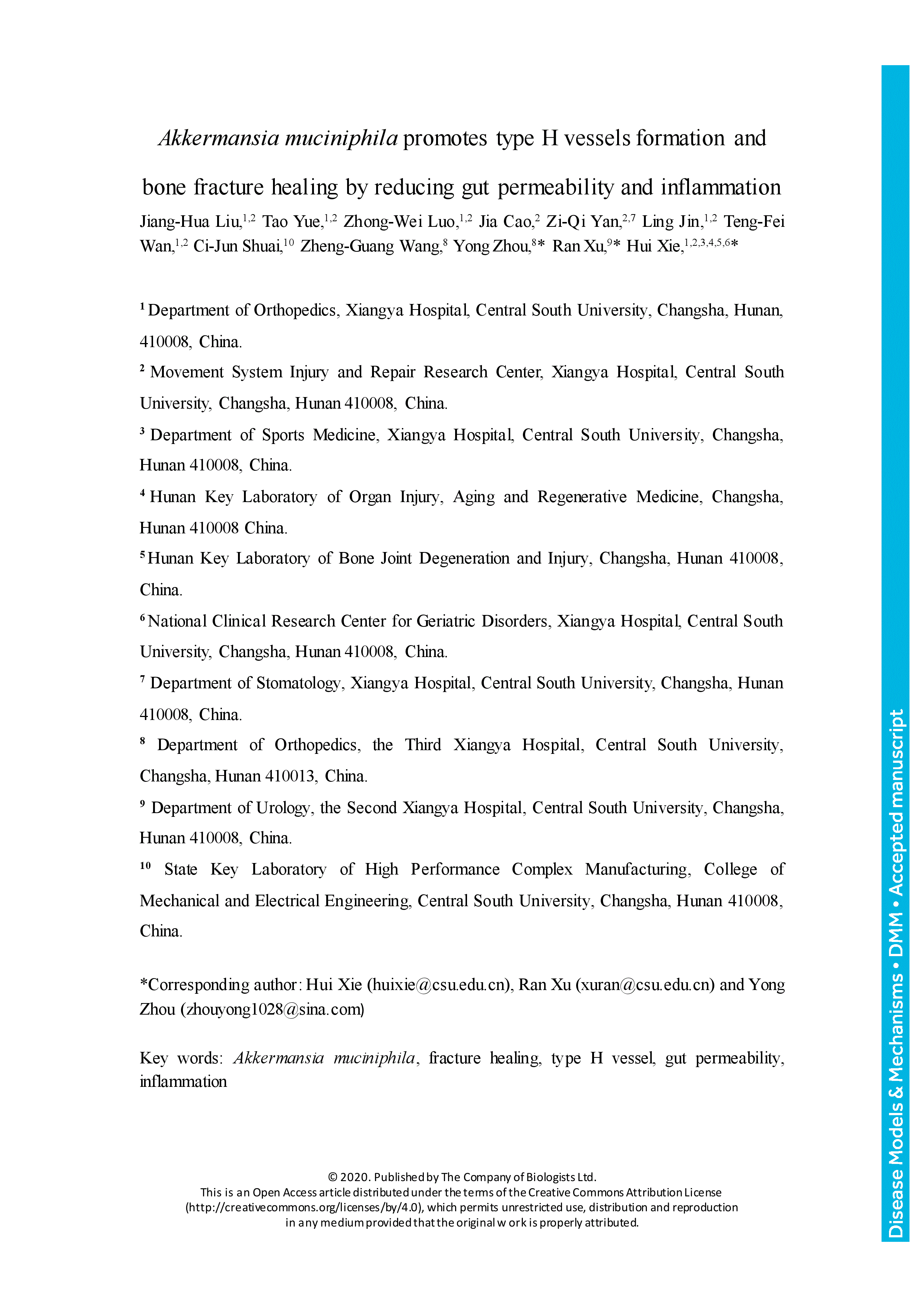Improving revascularization is one of the major measures in fracture treatment. Moderate local inflammation triggers angiogenesis, whereas systemic inflammation hampers angiogenesis. Previous studies showed that Akkermansia muciniphila (A. muc), a gut probiotic, ameliorates systemic inflammation by tightening intestinal barrier. In this study, fractured mice intragastrically administrated with A. muc were found to display better fracture healing than mice treated with vehicle. Notably, more preosteclasts positive for platelet-derived growth factor-BB (PDGF-BB) were induced by A. muc at 2 weeks post fracture, coinciding with increased formation of type H vessels, a specific vessel subtype that couples angiogenesis and osteogenesis and can be stimulated by PDGF-BB. Moreover, A. muc treatment significantly reduced gut permeability and inflammation at early stage. Dextran Sulfate Sodium (DSS) was used to disrupt the gut barrier to determine the role of gut barrier in fracture healing and whether A. muc still can stimulate bone fracture healing. As expected, A. muc evidently improved gut barrier, reduced inflammation, and restored the impaired bone healing and angiogenesis in DSS-treated mice. Our results suggest that A. muc reduces intestinal permeability and alleviates inflammation, which probably induces more PDGF-BB positive preosteoclasts and type H vessel formation in callus, thereby promoting fracture healing. This study provides the evidences about the involvement of type H vessels in fracture healing and suggests the potential of A. muc as a promising strategy for bone healing.
Akkermansia muciniphila promotes type H vessels formation and bone fracture healing by reducing gut permeability and inflammation
Currently Viewing Accepted Manuscript - Newer Version Available
Jiang-Hua Liu, Tao Yue, Zhong-Wei Luo, Jia Cao, Zi-Qi Yan, Ling Jin, Teng-Fei Wan, Ci-Jun Shuai, Zheng-Guang Wang, Yong Zhou, Ran Xu, Hui Xie; Akkermansia muciniphila promotes type H vessels formation and bone fracture healing by reducing gut permeability and inflammation. Dis Model Mech 2020; dmm.043620. doi: https://doi.org/10.1242/dmm.043620
Download citation file:
Advertisement
Sex matters in preclinical research

DMM calls for improved inclusion, analysis and reporting of sex as a biological variable in preclinical animal modelling research. Read the full Editorial by Monica J. Justice.
Subject collection: Building advocacy into research

DMM’s new series - Building advocacy into research - features interviews, ‘The Patient’s Voice’, with patients and advocates for a range of disease types, with the aim of supporting the highest quality research for the benefit of all patients affected by disease.
Travelling Fellowships for early-career researchers

DMM and its sister journals offer Travelling Fellowships of up to £3,000 to graduate students and post-doctoral researchers wishing to make collaborative visits to other laboratories. Find out more about our Travelling Fellowships and read stories from previous grant recipients.
Read & Publish Open Access publishing: what authors say

We have had great feedback from authors who have benefitted from our Read & Publish agreement with their institution and have been able to publish Open Access with us without paying an APC. Read what they had to say.
The Forest of Biologists
Our Publisher Claire Moulton recently visited the two Woodland Trust UK sites where we are planting new native trees for published Research and Review papers and protecting ancient woodland on behalf of our peer reviewers.
Other journals from
The Company of Biologists



